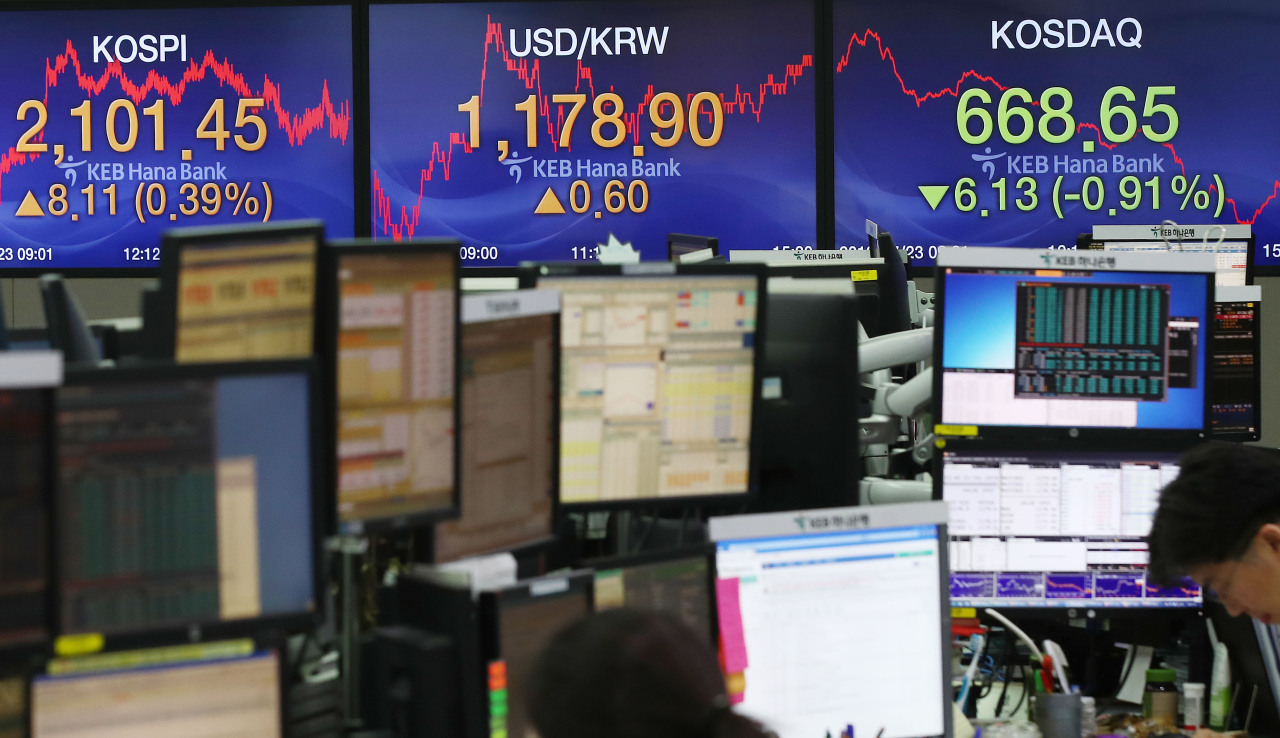Seoul stocks dip for 6th straight session, Korean won slightly up amid US-China trade war woes
By YonhapPublished : Aug. 7, 2019 - 17:08
South Korean shares fell for the sixth consecutive session on Wednesday as market sentiment still remained fragile over escalating trade tensions between Washington and Beijing, despite some signs of calm after China moved to stabilize its currency. The Korean won held steady against the US dollar.

The benchmark Korea Composite Stock Price Index declined 7.79 points, or 0.41 percent, to 1,909.71, marking the lowest level since Feb. 18, 2016, when the index stood at 1,908.84.
It was the first time in about five months that the KOSPI extended losses for a sixth straight session.
Trading volume was moderate at 752 million shares worth 5.3 trillion won ($4.4 billion), with gainers outnumbering losers 530 to 300.
The KOSPI opened higher in line with overnight gains on Wall Street as a fragile calm returned to the market over the Chinese move to hold off a steep decline in its yuan currency.
In its latest tweak to the prolonged trade spat, China allowed the yuan to fall below the 7-per-dollar level early this week, prompting the United States to designate Beijing a currency manipulator.
Market anxiety has deepened as the tit-for-tat measures signaled that the trade spat may morph into a full-blown currency war.
Finance Minister Hong Nam-ki called an emergency meeting with top financial policymakers earlier in the day and said the government will take swift and bold steps if necessary to help stabilize the financial markets.
"Under the contingency plan that has already been devised, (the government) will take swift and bold steps through all available means, such as stock market stabilization measures and easing regulations on buybacks and tightening rules on short selling, at a suitable time," Hong said.
Suh Sang-young, an analyst at Kiwoom Securities Co., said investors remained cautious about the trade tension between Washington and Beijing, although a sell-off of local stocks appears to be easing after Wall Street gains.
"Amid higher uncertainties over US-China trade tension, investors have sensitively responded to the yuan's movement," Suh said.
No Dong-gil, an analyst at NH Investment & Securities, said the KOSPI is unlikely to rebound for a while, citing the Korean currency's slide against the US dollar. The won has dropped about 8 percent against the US dollar so far this year.
As the won fell below 1,200 per the US dollar, the KOSPI has become the worst performer among major emerging markets, No said.
Foreign and institutional investors sold a net 196 billion won worth of local stocks, while retail investors bought a net 177 billion won worth of stocks.
In the past six sessions, foreign investors dumped a net 1.47 trillion won worth of local stocks. Analysts said foreign selling spree may continue because of the won's weakness against the greenback.
Another point in focus is that South Korea's weighting in the MSCI Emerging Markets Index will be cut this month and it may further trigger a foreign selling. Samsung Securities estimated that the MSCI index adjustment for South Korea would trigger a net outflow of 700 billion won from the country's stock market.
Large caps traded mixed, with Samsung Electronics falling 0.69 percent to end at 43,200 won and SK hynix, a global chipmaker, gaining 1.81 percent to 73,300 won.
Naver, the operator of the country's top internet portal, shed 0.72 percent to 137,500 won.
Automakers traded in positive terrain, with industry leader Hyundai Motor up 0.79 percent to 127,000 won and its smaller affiliate Kia Motors climbing 0.96 percent to 41,050 won.
The local currency closed at 1,214.90 won against the US dollar, up 0.4 won from the previous session's close.
International ratings agency Standard and Poor's said in a report that the Korean won will be under depreciation pressure if the yuan, also known as the renminbi, remains weaker.
"Exchange rates across Asia-Pacific will face depreciation pressures if renminbi weakness persists, reflecting a new 'renminbi bloc,'" the ratings agency said.
"The dollar retains its importance for some currencies, especially those associated with current-account deficit economies, but we see a very strong paradigm shift from being firmly in a 'dollar bloc' to having higher sensitivity to movements in the renminbi. This includes currencies such as the Australian dollar, Korean won and Malaysian ringgit," it said.
Bond prices, which move inversely to yields, also rose to fresh record highs amid increased appetite for safer assets. The yield on three-year Treasurys fell 1.0 basis point to 1.153 percent and the return on the benchmark five-year government bond declined 0.3 basis point to 1.181 percent. (Yonhap)







![[Graphic News] More Koreans say they plan long-distance trips this year](http://res.heraldm.com/phpwas/restmb_idxmake.php?idx=644&simg=/content/image/2024/04/17/20240417050828_0.gif&u=)
![[KH Explains] Hyundai's full hybrid edge to pay off amid slow transition to pure EVs](http://res.heraldm.com/phpwas/restmb_idxmake.php?idx=644&simg=/content/image/2024/04/18/20240418050645_0.jpg&u=20240419100350)






![[From the Scene] Monks, Buddhists hail return of remains of Buddhas](http://res.heraldm.com/phpwas/restmb_idxmake.php?idx=652&simg=/content/image/2024/04/19/20240419050617_0.jpg&u=20240419175937)

![[KH Explains] Hyundai's full hybrid edge to pay off amid slow transition to pure EVs](http://res.heraldm.com/phpwas/restmb_idxmake.php?idx=652&simg=/content/image/2024/04/18/20240418050645_0.jpg&u=20240419100350)

![[Today’s K-pop] Illit drops debut single remix](http://res.heraldm.com/phpwas/restmb_idxmake.php?idx=642&simg=/content/image/2024/04/19/20240419050612_0.jpg&u=)